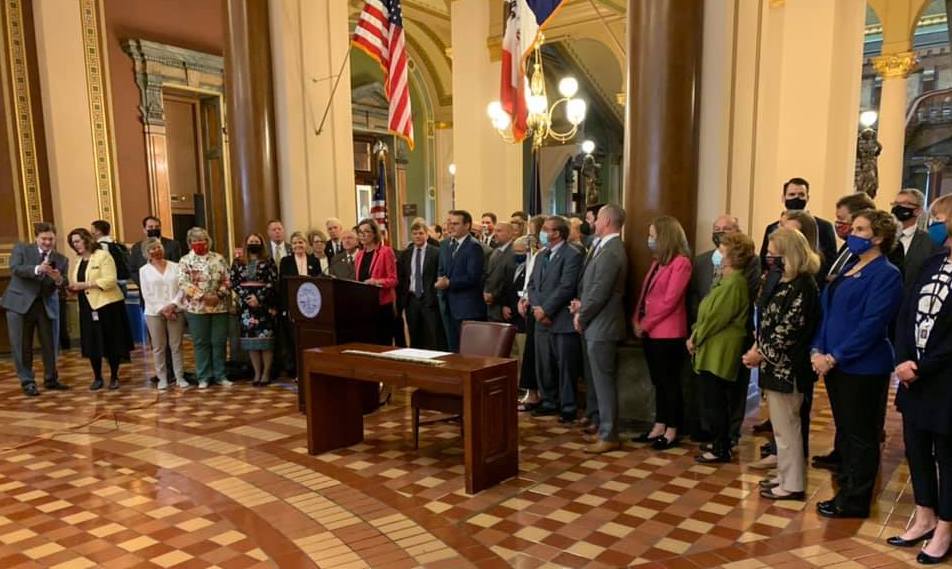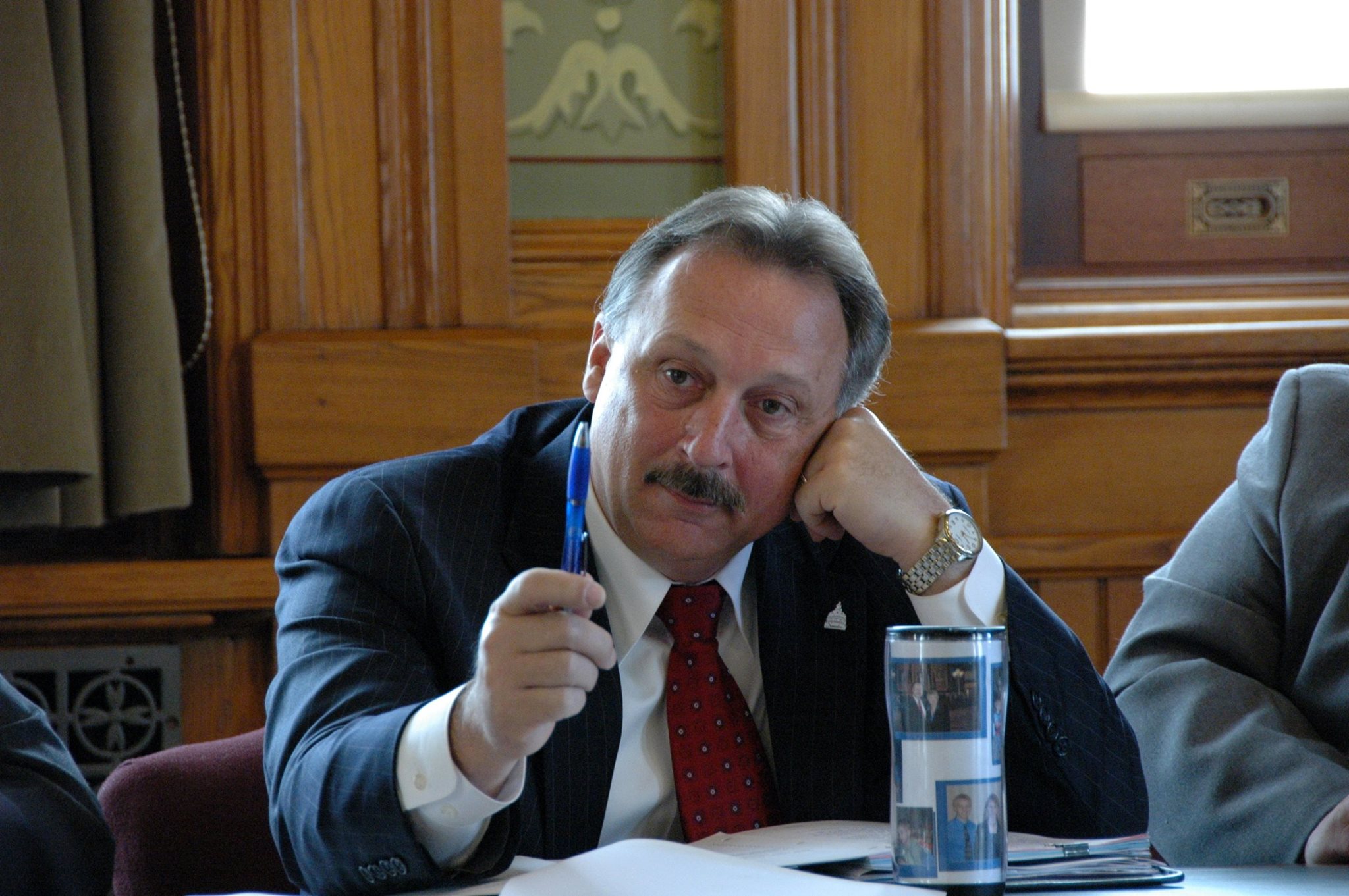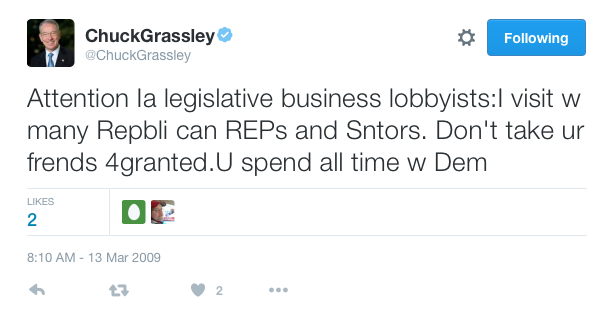The highlight of Governor Chet Culver’s “condition of the state” address yesterday (video here and prepared text here) was a proposal to issue state bonds to borrow up to $700 million over the next few years:
Thousands of new jobs will be created, Culver said. Every $100 million spent on highway construction alone means more than 4,000 new jobs, he said.
“We’re cutting back on the day-to-day expenditures of state government,” Culver said in his Condition of the State speech this morning. “But, at the same time, we will be investing in bricks and mortar – to create jobs and keep our economy going.”
Culver said Iowa won’t need to raise taxes to pay for the plan. The state is in the position to issue bonds, which is essentially borrowing money. Existing gaming revenue would repay the bonds, he said.
Predictably, road industry lobbyists like the spending plans while expressing some doubts about the borrowing plans.
Republicans also don’t seem to like the bonding proposal, while statehouse Democrats think it’s a good idea. State Auditor David Vaudt, who may be a Republican candidate for governor in 2010, said he needed to study the details before expressing an opinion, but noted, “What we’ve got to remember is we’ve got to dedicate and set aside a piece of revenue stream to pay that principal and interest.”
Senate Majority Leader Mike Gronstal made a great point:
Gronstal deflected Republican criticism by pointing out that [Senate Minority leader Paul] McKinley, in his opening day speech, talked about a business he once owned.
“He borrowed every nickel he could and leveraged himself as far as he could because he believed in his future. I believe in Iowa’s future. I believe it makes sense now to borrow money and move this state forward,” Gronstal said.
He added: “This is probably one of the best times in our history to go out and borrow money with a dedicated repayment stream. Do you own a home? Did it make sense for you to borrow money? Or did you just pay cash?”
Gronstal is absolutely right. Iowa has a triple-A bond rating, interest rates are fairly low, and creating jobs is essential to bringing the economy back. Two-thirds of our economy depends on consumer spending, and good jobs generate the money people then spend at businesses in their communities. Construction jobs tend to be good jobs too.
Des Moines Register columnist David Yepsen, who is usually a deficit hawk, also likes the infrastructure bonding idea:
The money will be borrowed over the next few years, supervised by an oversight board and repaid with gambling profits, so no tax increases will be necessary. (If we have to have all this gambling in Iowa, wouldn’t it be nice to see something tangible in return?)
It will be the modern-day equivalent of the Depression-era Works Progress Administration, which built infrastructure we still use today, such as dams, sewers, parks and shelters. Previous American generations left us wonderful systems of interstates, canals, railroads, river locks and dams. What are we leaving our kids? Potholes, bridge collapses and sewers that pollute river ways.
Iowans are a frugal people. Perhaps we are too frugal. According to state Treasurer Mike Fitzgerald’s office, Moody’s Investors Service says Iowa’s per-capita level of public debt ranked 48th in the country last year. Iowa has $98 of state public debt per person. The national average of state debt is $1,158. You could double Iowa’s $98 of per-capita state debt to $200, and we would then rank 46th.
Culver should have told us that. Clearly, most other states saddle their citizens with more debt than is proposed here. And many are more attractive places to live, too, as our children attest when they leave for the better jobs and brighter lights elsewhere.
It’s funny to watch all these Republican legislators, who borrow all sorts of money to buy, expand or repair homes, businesses and farms, now turn prune-faced when Culver suggests doing the exact same thing in state government.
The Des Moines Register explained how Culver’s plan would work:
* Borrow $700 million in 20-year tax-exempt state revenue bonds
* Secure the bonds with about $56 million a year in gaming tax revenues
* Create a Rebuild Iowa Infrastructure Authority to issue the bonds. It will be overseen by a five-member board.
* The authority would be administered and staffed by the Iowa Finance Authority.
How money will be spent:
housing
trails
highways
roads
bridges
mass transit
railways
airports
water quality and wastewater treatment improvements
flood control improvements
energy infrastructure
disaster-relief infrastructure
public buildings
Projects will be judged on:
Whether they are ready to proceed
How quickly the project can be started and completed
Number of jobs to be created by the project
Contribution to sustainability
On the whole, I support the idea. My main concern is that infrastructure money be spent on fixing what we already have, not on building every new road on developers’ wish lists. In the past, our legislators and state officials have focused too much on funding new roads instead of a balanced transportation policy.
The housing slump is likely to continue for at least two more years, and there is no reason to spend large sums to build new highway interchanges and major new roads through undeveloped farmland now. We should spend the money to fix stretches of existing major roads and highways and crumbling bridges, as well as on modes of transit that allow alternatives to driving. These projects will improve the quality of life for large numbers of Iowans while also creating jobs.
As for airports, I would only support spending money on needed repairs and improvements to existing airports. This is not the time to start building a bunch of small regional airports that would benefit a handful of corporate executives.
Culver emphasized that he did not plan to raise taxes, but Gronstal indicated that raising the state gas tax is still on the table.
I would like to hear more lawmakers talk about closing various tax loopholes that mainly benefit wealthy Iowans. The Iowa Policy Project has documented this and various other flaws in our current tax policies.
If you’ve got the time and the inclination, the governor’s official website has a video Culver showed during his address, called “In Deep Water: The Flood of 2008.” Iowa Public Television has House Minority leader Kraig Paulsen’s response to Culver’s address.
Continue Reading...



